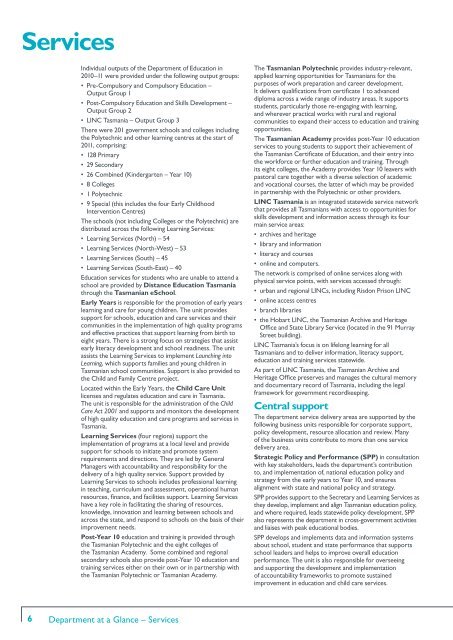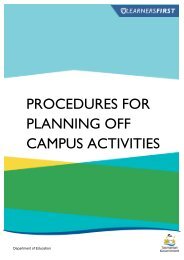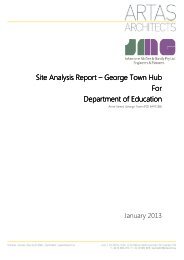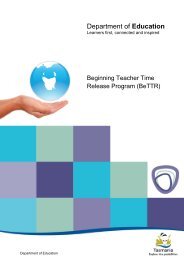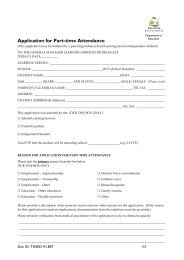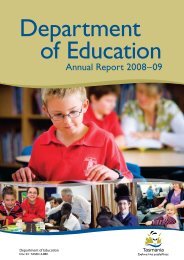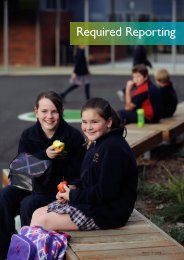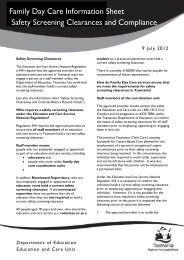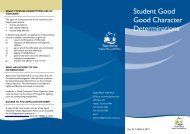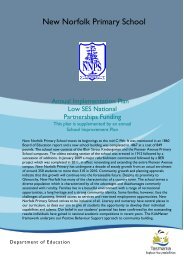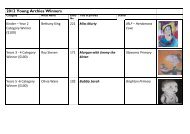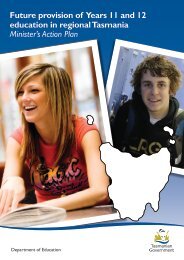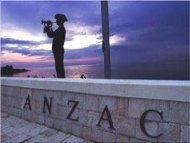Department of Education
DoE Annual Report 2010-2011 - Department of Education
DoE Annual Report 2010-2011 - Department of Education
- No tags were found...
You also want an ePaper? Increase the reach of your titles
YUMPU automatically turns print PDFs into web optimized ePapers that Google loves.
Services<br />
Individual outputs <strong>of</strong> the <strong>Department</strong> <strong>of</strong> <strong>Education</strong> in<br />
2010–11 were provided under the following output groups:<br />
• Pre-Compulsory and Compulsory <strong>Education</strong> –<br />
Output Group 1<br />
• Post-Compulsory <strong>Education</strong> and Skills Development –<br />
Output Group 2<br />
• LINC Tasmania – Output Group 3<br />
There were 201 government schools and colleges including<br />
the Polytechnic and other learning centres at the start <strong>of</strong><br />
2011, comprising:<br />
• 128 Primary<br />
• 29 Secondary<br />
• 26 Combined (Kindergarten – Year 10)<br />
• 8 Colleges<br />
• 1 Polytechnic<br />
• 9 Special (this includes the four Early Childhood<br />
Intervention Centres)<br />
The schools (not including Colleges or the Polytechnic) are<br />
distributed across the following Learning Services:<br />
• Learning Services (North) – 54<br />
• Learning Services (North-West) – 53<br />
• Learning Services (South) – 45<br />
• Learning Services (South-East) – 40<br />
<strong>Education</strong> services for students who are unable to attend a<br />
school are provided by Distance <strong>Education</strong> Tasmania<br />
through the Tasmanian eSchool.<br />
Early Years is responsible for the promotion <strong>of</strong> early years<br />
learning and care for young children. The unit provides<br />
support for schools, education and care services and their<br />
communities in the implementation <strong>of</strong> high quality programs<br />
and effective practices that support learning from birth to<br />
eight years. There is a strong focus on strategies that assist<br />
early literacy development and school readiness. The unit<br />
assists the Learning Services to implement Launching into<br />
Learning, which supports families and young children in<br />
Tasmanian school communities. Support is also provided to<br />
the Child and Family Centre project.<br />
Located within the Early Years, the Child Care Unit<br />
licenses and regulates education and care in Tasmania.<br />
The unit is responsible for the administration <strong>of</strong> the Child<br />
Care Act 2001 and supports and monitors the development<br />
<strong>of</strong> high quality education and care programs and services in<br />
Tasmania.<br />
Learning Services (four regions) support the<br />
implementation <strong>of</strong> programs at a local level and provide<br />
support for schools to initiate and promote system<br />
requirements and directions. They are led by General<br />
Managers with accountability and responsibility for the<br />
delivery <strong>of</strong> a high quality service. Support provided by<br />
Learning Services to schools includes pr<strong>of</strong>essional learning<br />
in teaching, curriculum and assessment, operational human<br />
resources, finance, and facilities support. Learning Services<br />
have a key role in facilitating the sharing <strong>of</strong> resources,<br />
knowledge, innovation and learning between schools and<br />
across the state, and respond to schools on the basis <strong>of</strong> their<br />
improvement needs.<br />
Post-Year 10 education and training is provided through<br />
the Tasmanian Polytechnic and the eight colleges <strong>of</strong><br />
the Tasmanian Academy. Some combined and regional<br />
secondary schools also provide post-Year 10 education and<br />
training services either on their own or in partnership with<br />
the Tasmanian Polytechnic or Tasmanian Academy.<br />
The Tasmanian Polytechnic provides industry-relevant,<br />
applied learning opportunities for Tasmanians for the<br />
purposes <strong>of</strong> work preparation and career development.<br />
It delivers qualifications from certificate 1 to advanced<br />
diploma across a wide range <strong>of</strong> industry areas. It supports<br />
students, particularly those re-engaging with learning,<br />
and wherever practical works with rural and regional<br />
communities to expand their access to education and training<br />
opportunities.<br />
The Tasmanian Academy provides post-Year 10 education<br />
services to young students to support their achievement <strong>of</strong><br />
the Tasmanian Certificate <strong>of</strong> <strong>Education</strong>, and their entry into<br />
the workforce or further education and training. Through<br />
its eight colleges, the Academy provides Year 10 leavers with<br />
pastoral care together with a diverse selection <strong>of</strong> academic<br />
and vocational courses, the latter <strong>of</strong> which may be provided<br />
in partnership with the Polytechnic or other providers.<br />
LINC Tasmania is an integrated statewide service network<br />
that provides all Tasmanians with access to opportunities for<br />
skills development and information access through its four<br />
main service areas:<br />
• archives and heritage<br />
• library and information<br />
• literacy and courses<br />
• online and computers.<br />
The network is comprised <strong>of</strong> online services along with<br />
physical service points, with services accessed through:<br />
• urban and regional LINCs, including Risdon Prison LINC<br />
• online access centres<br />
• branch libraries<br />
• the Hobart LINC, the Tasmanian Archive and Heritage<br />
Office and State Library Service (located in the 91 Murray<br />
Street building).<br />
LINC Tasmania’s focus is on lifelong learning for all<br />
Tasmanians and to deliver information, literacy support,<br />
education and training services statewide.<br />
As part <strong>of</strong> LINC Tasmania, the Tasmanian Archive and<br />
Heritage Office preserves and manages the cultural memory<br />
and documentary record <strong>of</strong> Tasmania, including the legal<br />
framework for government recordkeeping.<br />
Central support<br />
The department service delivery areas are supported by the<br />
following business units responsible for corporate support,<br />
policy development, resource allocation and review. Many<br />
<strong>of</strong> the business units contribute to more than one service<br />
delivery area.<br />
Strategic Policy and Performance (SPP) in consultation<br />
with key stakeholders, leads the department’s contribution<br />
to, and implementation <strong>of</strong>, national education policy and<br />
strategy from the early years to Year 10, and ensures<br />
alignment with state and national policy and strategy.<br />
SPP provides support to the Secretary and Learning Services as<br />
they develop, implement and align Tasmanian education policy,<br />
and where required, leads statewide policy development. SPP<br />
also represents the department in cross-government activities<br />
and liaises with peak educational bodies.<br />
SPP develops and implements data and information systems<br />
about school, student and state performance that supports<br />
school leaders and helps to improve overall education<br />
performance. The unit is also responsible for overseeing<br />
and supporting the development and implementation<br />
<strong>of</strong> accountability frameworks to promote sustained<br />
improvement in education and child care services.<br />
6<br />
<strong>Department</strong> at a Glance – Services


